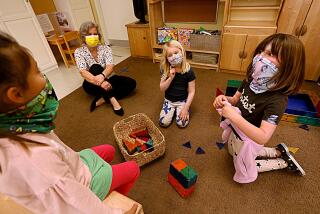Kids Whose Moms Work Not Harmed, Study Says
- Share via
WASHINGTON — Children of women who work outside the home are not significantly harmed by their mothers’ absence, according to a study that evaluated the development and health of more than 6,000 youngsters.
“I found there was no difference between children whose mothers were employed versus children whose mothers were not employed during the first three years,” said Elizabeth Harvey, a psychologist at the University of Massachusetts at Amherst. “Being employed is not going to harm the children.”
Harvey’s study, published in the March issue of the journal Developmental Psychology, came to a different conclusion from some earlier studies of the same group of children. The new work examined the children at a later age, 12 years old.
This suggests, said David Eggebeen of Penn State University, who co-authored an earlier study, that problems detected in children of working mothers at age 3 and 4 may be resolved by the time the children are 12.
“Harvey’s study suggests that the number of hours spent away from home is not as important as the quality of parenting,” said Lindsay Chase-Lansdale, an associate professor of human development at the University of Chicago. She called the Harvey study “an important contribution” but not the final answer on issues relating to children and working mothers.
In the study, Harvey used data from the National Longitudinal Survey of Youth, an in-depth interview study of males and females between the ages of 14 and 22 that started in 1979. Harvey concentrated on children born to the women in the study after 1980. The children were assessed every other year from 1986 to 1994.
There were more than 6,000 children of all races in the study, most evaluated more than once. The youngest child assessed was 3, the oldest 12.
Harvey used standard psychological tests to evaluate language development, academic achievement, self-esteem and behavior problems. Some of the results were based on parental reports.
In comparison with children of mothers who did not work, Harvey said she found no statistically significant difference in any of the measures.
However, when comparing children within the group of mothers who had outside employment, Harvey found very slight differences that were dependent on how many hours the mother worked and how soon she started work after the child was born. Some women in the study returned to work as quickly as four weeks after giving birth, while others waited three years.
“Returning to work later . . . was associated with more compliant children,” Harvey said.






